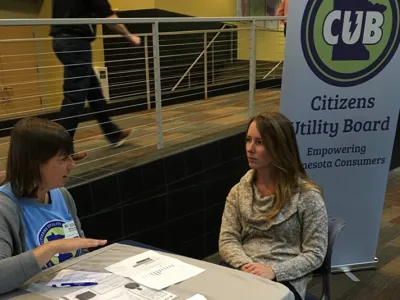The insider's guide to a CUB energy consultation
May 7, 2018

Published May 7, 2018
Energy bill consultations are one of CUB’s key outreach services. With a free one-on-one consultation, we help people find ways to save energy in their homes or apartments. Keep reading to find out what you can expect from an energy consultation and how to get one!
Why have a bill consultation?
Because in just 20 minutes you will get several ideas to save money and reduce your carbon footprint. Saving money and saving energy? It’s a win-win. Energy is a significant portion of many people’s budgets. Even if energy is not something that crosses your mind often, saving energy can lead to significant money savings.
What should I bring?
Bring at least one month of your natural gas and electric bills. You can bring a printed version or show them to us on an electronic device.
How long will it take?
Not long. 20 minutes -- this should sound familiar (see above). We can spend more time if needed, but we pack in a lot in 20 minutes: A lot of questions leads to a lot of information and suggestions.
What can I expect?
A lot of questions (see above). That is the hallmark of a CUB energy consultation. We’re not trying to be nosy, but we need to ask a bunch of questions to help consumers find opportunities for energy savings. Don’t worry; we’re fast talkers, so it doesn’t take long. You remember now, right? About 20 minutes.
Here’s how it typically goes:
- “What do you want to talk about today?” Some people want a typical consult, others have very specific things they want to discuss such as participating in renewable energy, building an energy efficient house, etc. It's your time; we’re here to help.
- “Do you rent or do you own your home?” What you can control in terms of energy use varies based on whether you rent your home or own it.
- “How big is your home?” Home size can affect the amount of electricity used and it definitely affects the amount of energy needed to heat your home.
- “What year was it built?” Homes of certain eras tend to have varying levels of insulation and drafts. Some homes have no insulation and a lot of drafts! We can probably tell by looking at your bills.
- “How many people live in the home, and what are their schedules?” More people generally means more energy use: more laundry, more hot water, more dishwashing, etc. If the house is occupied all the time, more energy will be used than if everyone is gone for 8 hours a day.
- “What type of heating and cooling systems do you have?” This helps us understand how your home operates and can lead to a variety of suggestions.
- “What uses gas versus electricity in your home? Dryer, stove, oven, and water heater.” This helps us sort out if you are using a typical amount of gas or electricity. It also allows us to point you to the right place for rebates when it's time to replace these big-ticket items.